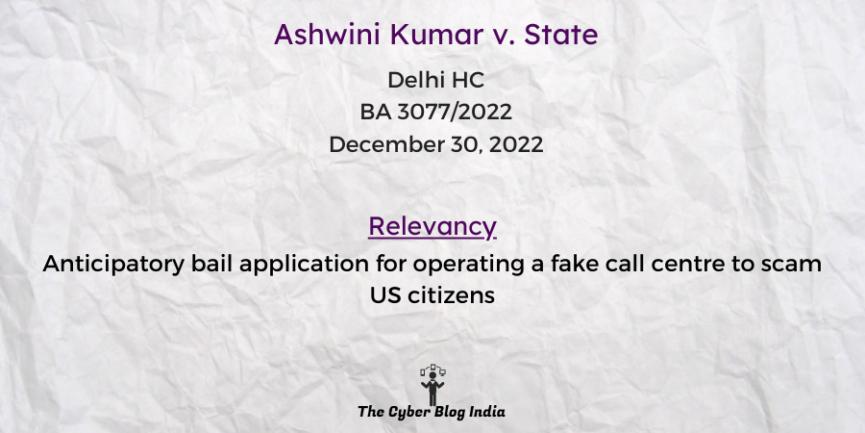Ashwani Kumar v. State

Ashwini Kumar v. State
In the High Court of Delhi
BA 3077/2022
Before Justice S.K. Sahoo
Decided on December 30, 2022
Relevancy of the case: Anticipatory bail application for operating a fake call centre to scam US citizens
Statutes and Provisions Involved
- The Information Technology Act, 2000 (Section 66C, 66D)
- The Indian Penal Code, 1860 (Section 419, 420, 467, 468, 471, 120B, 34)
Relevant Facts of the Case
- Someone filed a complaint with secret information about a fake call centre being operated to scam US citizens.
- Following a raid, the police arrested around 54 individuals and several computers, servers, and routers.
- The applicant, Ashwani Kumar, the call centre owner, and several other arrested persons allegedly participated in the act.
- The applicant filed for anticipatory bail before the trial court, which was rejected earlier.
Prominent Arguments by the Advocates
- The applicant’s counsel argued that he was merely the property owner where the scam operation occurred. He had rented the property to another person in November 2022. The police registered the FIR on December 15, 2021. At this time, the applicant was in Dubai, as per his Dominican Republic password. This is why he was not able to join the investigation.
- The respondent’s counsel argued that the rent agreement was not genuine. It was a self-serving document. There is no record of any police verification of the tenant. The applicant and others were wilfully absconding and evading the investigation. She based this argument on the fact that the applicant travelled to India numerous times using his Indian password. He did not surrender his Indian password after acquiring a Dominion Republican passport.
Opinion of the Bench
- The rent agreement available on record is doubtful. There are no transactions on record except two cash payments.
- Moreover, the property in question has been in the possession and ownership of another person since 2006. Hence, the rent agreement does not appear to be authentic.
- The applicant travelled to India twice in 2022. His claim that he was not available in the country is incorrect.
- The applicant had a significant role in the investigation, helping the investigation officer with many aspects, such as ascertaining the exact conduct of the operation and the involvement of others.
Final Decision
- The court rejected the application.
Aarya Tyagi, an undergraduate student at the Institute of Law, Nirma University, Ahemadabad, prepared this case summary during his internship with The Cyber Blog India in May/June 2024.
